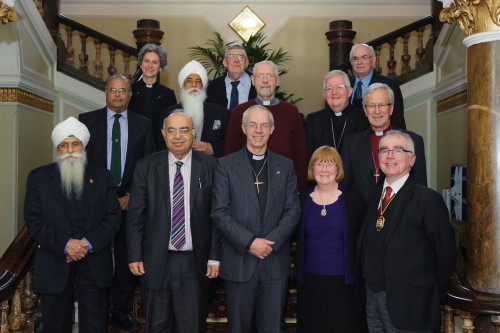
Amongst the Vasari frescoes In the Sala Regia in the Apostolic Palace at the Vatican is a series to make ecumenists blanche. It depicts the planning and implementation of the St Bartholomew’s Eve Massacre – the massacre in Paris on 23-24 August 1572, ordered by the King of France, of thousands of French Huguenot Protestants. In addition to commissioning the frescoes in celebration, Pope Gregory XIII ordered a Te Deum sung and had a medal struck with the motto Ugonottorum strages 1572 (Latin for “Slaughter of the Huguenots”), which showed an angel bearing a cross and sword standing over the bodies of French Protestants.
That was 1572. As well as a crime, the act was a political disaster. Fortunately, we have come a long way since. Speaking to the Holy See diplomatic corps in January this year, Pope Francis said that: “Religious fundamentalism, even before it eliminates human beings by perpetrating horrendous killings, eliminates God himself”. Just this month, he has received delegates from the Anglican – Roman Catholic International Commission conducting the next round of their ongoing discussions over Anglican-Catholic unity and understanding; from the joint commission of the Council of European churches (Orthodox, Anglican and Reformed church delegates) and the Catholic Council of the Conference of European Bishops; and representatives of Protestant Evangelical churches. All are involved in tireless rounds of ecumenical dialogue and encounter, focused not on what divides but what unites.
In my view, ecumenists are rather like diplomats. Their work can often be rather thankless, highlighted only when things go wrong. At the same time, if they do their job well, they act as bridge-builders, searching out common values, focused on peace and mutual understanding, and trying to solve sometimes intractable-looking problems along the way. I believe firmly in the importance of this, and it is why I see one of my roles as British ambassador to the Holy See as helping in my own small way to facilitate ecumenical work when I can – we are, essentially, in the same business of preventing and ending conflict.
It seems unlikely that what Pope Francis calls “the scandal of disunity” will be resolved any time soon. That does not make the role of ecumenists any less important. And if we start to become complacent, or if ecumenists themselves begin to feel disheartened or unappreciated, Pope Francis has also reminded us of a new form of ecumenism, “the ecumenism of blood”, the blood of inter-religious violence that does not make nice distinctions between Christian denominations. It makes one wonder whether we really have come that far since 1572. But it should also make us determined to keep working, in our different ways, to deal with the disunities – across ethnicities, faiths, nations – that continue to this day to undermine our security and sense of common humanity.
